- Home
- Raymond Benson
Blues in the Dark Page 3
Blues in the Dark Read online
Page 3
Her hotel was once a landmark destination. It had been built prior to the arrival of “the movies” in Southern California and was a place to be seen during the silent era and the thirties. However, by the mid-forties, the Hollywood Hotel had declined in both reputation and upkeep. That was why she could afford a room there by the week. It wouldn’t be long, though, before she would be forced to either find a waitress job or move out.
For the audition, she had chosen to wear a pinstriped two-piece dress with a fitted blouse that had a double bow motif at the waist and a high neckline. Blair had seen a picture of Betty Grable wearing something similar, and it suited her.
“Number seventy-two!”
Oh my God, here I go!
She got up and approached the man with the clipboard.
“What’s your name, honey?” he asked. She told him. “Follow me.”
They walked out onto the large soundstage. The spotlights were blinding, but she could see the silhouettes of three men in chairs. A camera on a tripod stood next to them, and there appeared to be an outline of another person behind it.
“Blair Kendrick,” the stage manager announced, and then he left her alone, vulnerable and exposed to the studio gods some twenty-five feet away who would decide her fate.
“Uhm, hi,” she said, giving a little wave. She put her flat hand over her eyes, attempting to see who was in front of her.
“Hi, sweetheart, do you have the sides with you?”
“Sides? Oh, you mean the script? Uh, no, no one gave me anything.”
She heard the men grumbling, and then one of them shouted, “Carl!”
The stage manager came running out. “Yes, sir?”
“She doesn’t have sides.”
“Oh, sorry.” He looked at her and growled, “What did you do with them?”
“I never got anything!” she whispered.
“Did you pick them up when you checked in?”
“There was nothing to pick up; there was just this woman with a list at a desk …”
“Never mind, stay right there.” He disappeared toward the green room.
Well, hell, she thought. Feeling self-conscious and embarrassed, she gave the men a shrug and a little laugh. “Wasn’t my fault, fellas,” she said.
She heard more mumbling. “Turn around, sweetheart,” the man sitting in the middle ordered. He sounded German, or something.
“What? You mean …?” She did a complete revolution on her feet, as if she were modeling a new dress—which she was.
“How tall are you?”
“Five-ten.”
“Where are you from?”
“Chicago.”
More mumbling. The same guy asked, “Can you say that without the accent?”
“What accent?”
The man laughed. “Honey, you have a Chicago accent. You say ‘Chicago.’ Like the ‘a’ in snack. We say, ‘Chicawgo.’ Like the ‘o’ in dog.”
“Yeah? Well, you probably say tomawto, and I say tomayto.”
The guy on the end laughed.
“What’s your name again, honey?” the heavier man on the other end asked. He seemed to exude more authority over the others.
“Blair Kendrick.”
Carl returned with pages in hand. He gave them to her and said with a low voice, “Don’t lose these.”
“I never lost the first ones because I never had them,” she said aloud.
After Carl left the space, the man in the middle—she presumed he was the director since he was giving her most of the direction—said, “Okay, doll, you’re Abigail. She’s not a nice lady; in fact, she’s out to squeeze our hero out of his money, and she uses her feminine charms to do it. You get my meaning?”
“Sure.”
“Read that monologue up at the top of the first page. You see that?”
“Yes, sir.”
She took a few seconds to compose herself, cleared her throat, and jumped in.
“Look, baby, I know you’re married, but I can’t help it if you do things to me. You make my heart just go all a-flutter and then my temperature starts to rise. It’s the way you look at me, the way you touch me, the way your mouth moves …. You do these things to me, Freddie, and I have to do something about it. If you’ll just sit down a minute, have a cigarette, maybe have a drink with me, I bet you I can do some of those same things to you.”
Blair stopped, looked up, and waited.
Mumbling.
“You have a nice delivery, honey,” the man in the middle said. “It’s kind of like Lauren Bacall, only your voice isn’t husky like hers. Do it again, please.”
“You want me to lower my voice?”
“No, no, it’s fine like it is. Try it again.”
She did, not varying the inflection much. They seemed to like it.
For the next ten minutes, she read more lines and then did a scene with an actor named Johnny who stood in for whoever the real star was going to be. Then they had her walk up and down some stairs that were on part of a set stored at the back of the soundstage. After that, they asked her to kiss the actor. He really got into it, so she did, too. Then she read some more.
None of the other girls had auditioned so long. She took this as a good sign.
Finally, all three men stood and walked over to her. The middle guy introduced himself as Emil Winder, and he was indeed the director. The fellow on his left was Buster Denkins, a producer. The other man, the one who seemed to be the boss, was none other than Eldon Hirsch, the president of Ultimate Pictures.
“I’m honored to meet you all,” Blair said. Her heart was pounding with excitement.
“Blair, we want you to do a screen test. George over there will shoot a little film of you. We’ll do those lines you just read and do some of those scenes with Johnny. We just want to see how you look on the big screen. Is that all right?”
“Well, sure!” Then she held up a hand. “But can I ask a question?”
“What’s that, dear?”
“Do you think I could get something to eat? I’m starving.”
The men laughed.
Carl sent the remaining girls home and made a call for sandwiches to be brought in. The men huddled, spoke for a few seconds, and then nodded their heads as if in agreement.
Ultimate Pictures had found its next star.
4
KARISSA
The move-in went smoothly. The furniture from the house Karissa had shared with Willy Puma—soon to be her ex- husband—was in storage. She wondered if she needed any of it. While the pieces in the house on Harvard Boulevard were decades old, they were still functional and went with the antiquity of the mansion. A new mattress was in order, for sure, but other items? Best to keep them stored until she’d lived in the place for a while. Was her residency in Sugar Hill only temporary? She didn’t know. She supposed that if she did decide to stay, then she would have to make the decision to modernize the entire place—or not.
There was a certain charm about the old house that was appealing. During her first day there, all Karissa could do was wander through and explore the many rooms. There were treasures to be opened and examined. Boxes, trunks, cabinets, and chests-of-drawers—all full of clothing and trinkets. The walk-in closet in the master bedroom contained vintage dresses, hats, and shoes. She had the frivolous idea of throwing a 1940s costume party for all her Hollywood friends.
Marcello Storm was also very impressed. Her colleague had come to help her move her things from the Executive Suites and the storage facility. A bulky weight lifter, he carried heavy boxes as if they were paper cups. When Karissa and Marcello were in college together, there were many who told him that he resembled a young Muhammad Ali.
“Girl, you’re going to get lost in this place,” he said, juggling some items while he ascended the stairs. “I hope you have a map.”
Karissa laughed and said, “Oh, I know my way around already. It isn’t that big.”
“It’s humongous. It’s a regular Taj Mahal! There are
probably secret passages that lead to other dimensions.”
They reached the master bedroom. “Just put down the boxes anywhere.”
He did and then went over to look at some of the photographs on the dresser.
“Blair Kendrick. She was something else.”
“Do you know much about her? I was going to start googling her tonight once I settled in. She sounds fascinating.”
“I guess she was.”
“Did she really get killed by the mob?”
Marcello picked up another picture. “That’s what they say.”
“Who’s they?”
He pulled out his cell phone. “I guess you don’t have your Wi-Fi set up yet?”
“Not yet. I need to do all that. You’re going to help me, right? The landlord just got cable installed today.” She started opening the boxes and putting her clothing away. There was still plenty of room in the closet, despite the presence of the antique items.
He fiddled with his phone as he spoke. “Is that all I’m good for? A glorified IT guy? The hired help?”
“Yep, and he can also negotiate amazing movie deals—that’s what you are.”
“Ha! Yeah, well, I suppose it’s getting easier these days, but Hollywood still belongs to middle-aged white guys.”
Karissa laughed.
“It wasn’t that long ago that Hollywood didn’t make movies with or for black folks,” he continued. “In the early days, we had to create our own underground system to make what were actually called ‘race’ movies that played in churches and rented halls and such.”
“I remember my Film History class, Marcello. Thank God for Oscar Micheaux.”
Marcello raised his eyebrows and nodded at her comment. “Okay, look here at Wikipedia.” He indicated his phone. “Blair Kendrick. It says she was a movie star who perished in a suspicious automobile mishap after possibly witnessing the July 1949 murder of Eldon Hirsch, the president of Ultimate Pictures. Speculation is that the mob chased her from the studio after the hit, caught her, and did away with her, but the case was never closed.” He started reading silently.
“Tell me more,” Karissa said as she put her shoes away.
“It talks about her rise to fame in just two years, that she was under contract with Ultimate, and she made six movies. She was being groomed to be the next Barbara Stanwyck or Bette Davis, as she showed not only beauty but a talent for acting. Says that she started out playing femmes fatales in film noir pictures but that she might have elevated herself to A-level pictures in time.”
“Keep going.”
“Uh, she was born in 1928 in Chicago, Illinois, came to Hollywood when she was eighteen, and made her first picture in 1947. It was a supporting role in A Kiss in the Night. She was the bad girl.” Marcello paused and said, “Mmm-mmpf.”
“What?”
“I was just looking at her pictures here. She was one good-looking white lady, I got to say. You think she looks like Jean Harlow?”
“I don’t know,” Karissa said, emerging from the closet. “Blond and ivory skin.” She shrugged and joined him to look at his phone. “Nah, she doesn’t look like Jean Harlow. She’s pretty, though.”
“I don’t think I’ve seen any of her films. It says The Jazz Club is the one that made her an overnight star.”
“What year was that?”
“That was ’47, too. It had some black actors in it—jazz musicians and such.”
“I love film noir, but I don’t think I’ve seen that one, either.”
He scrolled down on his phone. “Okay, it says here that all her films were withdrawn from circulation after the murder. Huh. No wonder we haven’t seen ’em.”
“The studio did that?”
“I guess. Here’s the stuff about the murder. Says on July 1, 1949, Blair Kendrick was seen entering the Ultimate Pictures studio lot in the evening around eight o’clock. The guard on duty at the gate, Barney Johnson, claimed she drove through in her Oldsmobile and waved hello. Since she was under contract, he didn’t stop her, although he told the police that he hadn’t seen her for months. A few minutes later, Johnson claimed that another car, occupied by a man at the wheel and a woman passenger, approached the gate. The driver shot him. He survived and lived to give a statement to the police, but he really didn’t know anything. He couldn’t identify the shooter. Eldon Hirsch, the head of the studio, was found in his office, shot to death. He’d also been robbed of a prized coin collection that he kept in a safe.”
“Huh.”
“Blair Kendrick’s car and a car registered in Nevada were discovered the next morning all the way up on Mulholland Drive, where they had been involved in a bad accident. Both cars were burned up, charred to a crisp, and the Nevada one had an unidentified body at the wheel. Suspected arson on both cars. Blair was found on the road next to the Nevada car. Badly burned and unrecognizable. She was eventually identified and buried in Westwood Village Cemetery. God, she must have crawled away from the burning wreck and died right there on the highway.”
“Jesus.”
“Right? Look here. Says a studio executive, Buddy Franco, may have been involved. He went missing after the incident.” Marcello clicked on the Buddy Franco hyperlink and reached a shorter entry on Wikipedia. “Buddy Franco was an executive vice president and studio fixer for Ultimate Pictures between 1942 and 1949. Well, look at this. Says he was a suspect in the murder of his boss, Eldon Hirsch! He had connections to the Las Vegas mafia and mysteriously disappeared the night of Hirsch’s murder. No one heard from him for years until 1975, when he was discovered in a diner in Las Vegas—shot to death by an unknown assailant. Police chalked it up to a mob hit. Again, nothing was ever proven, but it’s suspected that Franco may have been responsible for what happened on Mulholland Drive.”
“Oh, wow. It’s ironic that she played femmes fatales in her pictures. Why the hell did she live in this house, though?”
He kept reading. “Says here that she was a controversial figure even before her death because she chose to live in West Adams Heights—called ‘Sugar Hill’—among mostly African American movie stars and celebrities. Hmm. Doesn’t say why. Did Stepin Fetchit live here?”
“I don’t know. I think his star stopped shining by the late forties. Besides, he represented a characterization of a black man that I find offensive.”
“That’s true. By then we had actors playing real roles and not just butlers and maids and Tarzan natives. Remember James Edwards?”
“Of course. The man who could have been Sidney Poitier if he hadn’t pissed off the studios.”
“Yeah, I guess he was deemed too ‘uppity.’ I think he also slapped a white woman in public. I’m sure that went over well in the early fifties, or whenever it was. What about Dorothy Dandridge?” Marcello suggested.
“I absolutely love her. I’m not sure if she lived in West Adams Heights. She was married to one of the Nicholas Brothers for a while.”
“Now they could throw a mean tap dance. Who were some of the others during that period? Lena Horne and Pearl Bailey?”
“Uh huh. Ray Charles—his studio is a few blocks away on Washington, isn’t it? The point is … why did Blair Kendrick live here?”
“I don’t know, Karissa.”
“Well, I’m going to find out, but not now. Come on, let’s set up the Wi-Fi. We need to get to work on our new project.”
It hadn’t taken long to unpack all her things. All she’d really needed was everything she’d had at Executive Suites—her clothes, some files, a few books and CDs, and some personal keepsakes.
She set Julia—a very old rag doll she’d owned since she was a child—on Blair’s dresser next to one of the glamour photos of the actress. The doll was a kind of good-luck charm for Karissa. It wore a simple dress with the name Julia sewn into the hem. Julia had come along with Karissa on every move she’d ever made in her life.
“We’re starting a new life, Julia,” she announced to the doll. She didn’t feel foolish at all, a
lthough she thought the occasion called for a couple of glasses of wine.
That night, Karissa stayed up way too late exploring the rooms upstairs, especially the one full of boxes and a trunk. According to Mr. Trundy, they contained personal items belonging to Blair Kendrick, packed away for safekeeping. Karissa wondered for whom they had been kept. From what she’d read so far on the Internet, Blair had left no family behind.
Her thoughts trailed to Trundy. A strange bird. Karissa figured him to be one of those old-fashioned black people who looked down on mixed-race men and women. She had found throughout her life that prejudice could come from unexpected places and ran both ways. It seemed that when it was convenient for someone to think of her as white, she was simply lumped in with the rest of the white population, but when that became inconvenient, then she became most definitely black, a token representation of the entire race. She’d felt the same thing in her conversation with Trundy.
Karissa thought about whether she should be snooping in the boxes. Mr. Trundy hadn’t told her the things were off-limits. In fact, he had encouraged her to have a look. Perhaps because she worked in Hollywood?
She went to the trunk first and wiped it off with a kitchen rag. She was going to have to do a lot of dusting around the house. The trunk was unlocked, so she sat on the Persian rug and opened it. Inside were some items of clothing, a few stationery boxes, a stack of copies of the studio publicity portrait of Blair wearing the pearl necklace, and a couple of photo albums. She flipped one of the albums open and began to peruse.
It was fascinating. The book was filled with black-and-white pictures from yesteryear. Some appeared to be professionally taken—studio shots, glamour and publicity stills, and the like—others were candid, probably shot with Blair’s own or someone else’s personal camera. Karissa recognized parts of the house in some of the pictures—Blair had thrown a party at some point and documented it in photographs.
But Karissa was most struck by the faces in the photos—nearly everyone was black, except for Blair and a few others.

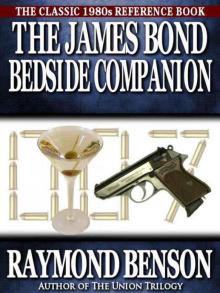 The James Bond Bedside Companion
The James Bond Bedside Companion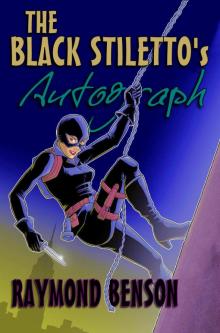 The Black Stiletto's Autograph
The Black Stiletto's Autograph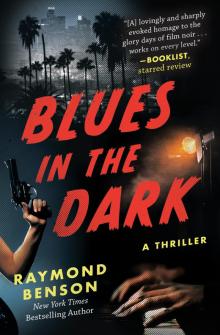 Blues in the Dark
Blues in the Dark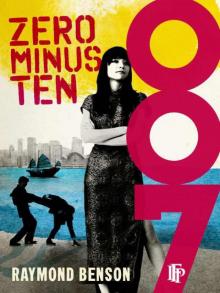 Zero Minus Ten
Zero Minus Ten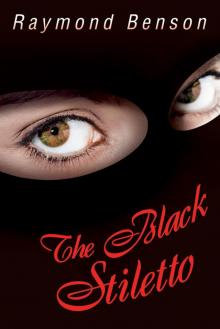 The Black Stiletto
The Black Stiletto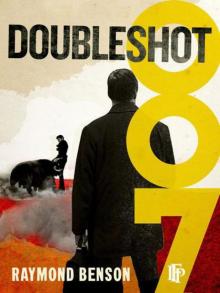 Doubleshot
Doubleshot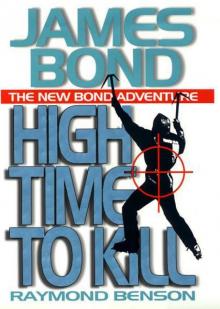 High Time To Kill rbb-3
High Time To Kill rbb-3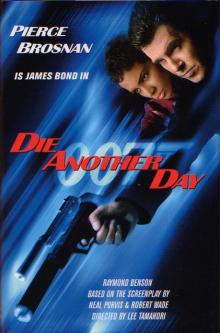 Bond Movies 07 - Die Another Day
Bond Movies 07 - Die Another Day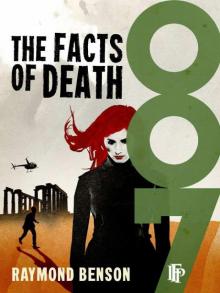 The Facts Of Death
The Facts Of Death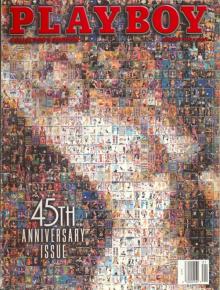 Midsummer Night's Doom
Midsummer Night's Doom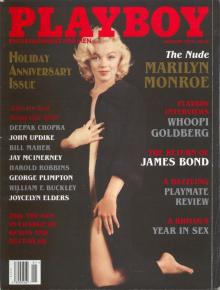 Blast from the Past
Blast from the Past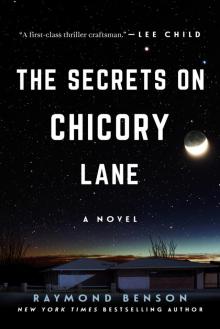 The Secrets on Chicory Lane
The Secrets on Chicory Lane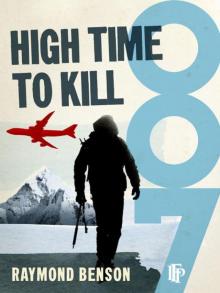 High Time To Kill
High Time To Kill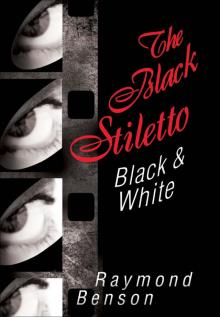 The Black Stiletto: Black & White
The Black Stiletto: Black & White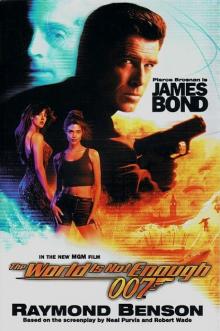 The World Is Not Enough jb-1
The World Is Not Enough jb-1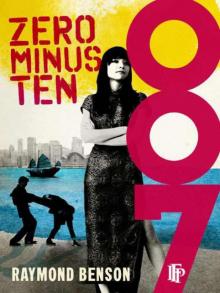 Zero Minus Ten rbb-1
Zero Minus Ten rbb-1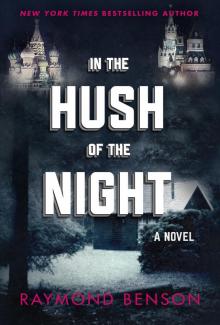 In the Hush of the Night
In the Hush of the Night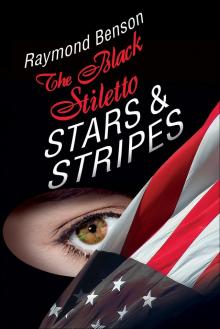 The Black Stiletto: Stars & Stripes
The Black Stiletto: Stars & Stripes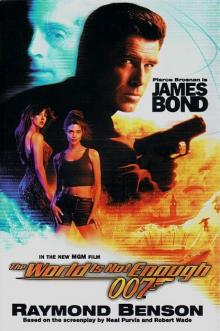 Bond Movies 06 - The World Is Not Enough
Bond Movies 06 - The World Is Not Enough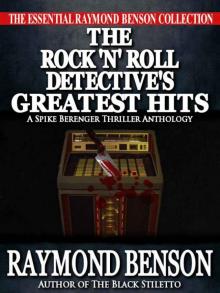 The Rock 'n Roll Detective's Greatest Hits - A Spike Berenger Anthology
The Rock 'n Roll Detective's Greatest Hits - A Spike Berenger Anthology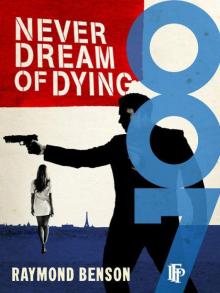 Never Dream Of Dying
Never Dream Of Dying